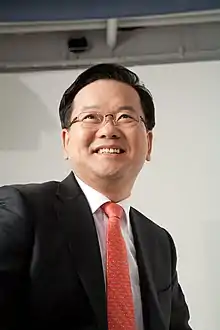Kim Boo-kyum
Kim Boo-kyum (Korean: 김부겸; Hanja: 金富謙; born 1 January 1958) is a South Korean politician who is presently a Minjoo Party member of the National Assembly for Suseong, Daegu and former minister of the Interior and Safety. He was formerly the member for Gunpo between 2000 and 2012, first for the Grand National Party and then, from 2003,[1] the liberal Uri Party and its successors. In the 2016 parliamentary election in Daegu, Kim defeated his Saenuri opponent Kim Moon-soo in a 62.5 percent landslide, marking the first time a member of a liberal party had been elected in that city since 1985.[2] Kim had earlier stood for mayor of Daegu in the 2014 local elections, and received 40 percent of the vote, a number seen at the time as unusually large in the conservative stronghold. He stated in 2014 that he hoped to "overcome the barrier of regionalism".[3]
Kim Boo-kyum | |
|---|---|
김부겸 | |
 | |
| Minister of the Interior and Safety | |
| In office 16 June 2017 – 6 April 2019 | |
| Prime Minister | Lee Nak-yeon |
| Preceded by | Hong Yoon-shik |
| Succeeded by | Chin Young |
| Member of the National Assembly | |
| In office 30 May 2016 – 29 May 2020 | |
| Preceded by | Lee Hahn-koo |
| Succeeded by | Joo Ho-young |
| Constituency | Suseong A (Daegu) |
| In office 30 May 2000 – 29 May 2012 | |
| Preceded by | Lew Seon-ho |
| Succeeded by | Lee Hack-young |
| Constituency | Gunpo |
| Personal details | |
| Born | January 21, 1958 Sangju, South Korea |
| Citizenship | South Korean |
| Political party | Democratic Party of Korea |
| Other political affiliations | Hannara Party (2000-2003) |
| Alma mater | Seoul National University |
| Korean name | |
| Hangul | |
| Hanja | |
| Revised Romanization | Gim Bugyeom |
| McCune–Reischauer | Kim Pugyŏm |
Kim is considered a centrist.[4] As a member of the Grand National Party he pressed for reform in the party,[5] and when he defected from the party in 2003 he cited the need "to unify the nation ... and to root out regionalism".[6] A 2008 U.S. diplomatic cable released by WikiLeaks described Kim as a "reasonable progressive lawmaker" representing a "centrist platform",[7] and as a member of the Supreme Council of the Democratic United Party in 2012 he defended centrist members of the party from deselection.[8] Commentators have named Kim a potential candidate in the 2017 presidential elections.[3][9]
Kim was admitted to study political science at Seoul National University in 1976,[10] but was expelled for taking part in protests against the Yushin Constitution in 1977, before being readmitted and expelled again for violating martial law in 1980. He was later reinstated a second time, and received his degree in 1987.[11]
Kim's daughter, Yoon Se-in (born Kim Ji-su), is a television actress.[12] Yoon campaigned for Kim in the 2012 parliamentary election[13] and the 2014 mayoral race,[14] but was unable to in 2016.[15]
References
- "Movement for Reformative Party Starts". The Chosun Ilbo. 7 July 2003. Retrieved 17 April 2016.
- "Kim Boo-kyum Receives a Magical 62.5% of Votes, "The Citizens of Daegu Have Rewritten History"". The Kyunghyang Shinmun. 14 April 2016. Retrieved 17 April 2016.
- "After Daegu election loss, NPAD's Kim looks to 2016". Korea JoongAng Daily. 11 June 2014. Retrieved 17 April 2016.
- "NPAD centrists explore new election tactics". The Korea Herald. 23 June 2014. Retrieved 17 April 2016.
- "Call for Reform Unlikely to Rock GNP". The Korea Times. 4 June 2001. Archived from the original on 29 May 2016. Retrieved 17 April 2016.
- "5 lawmakers leave GNP to form a new reform party". Korea JoongAng Daily. 7 July 2003. Retrieved 17 April 2016.
- "Opposition lawmaker Kim Boo-kyum on beef, FTA, UDP future". WikiLeaks. 13 May 2008. WikiLeaks cable: 08SEOUL977_a. Archived from the original on 17 April 2016. Retrieved 17 April 2016.
- "DUP hardliners sniff out moderates". Korea JoongAng Daily. 22 February 2012. Retrieved 17 April 2016.
- Minegishi, Hiroshi (15 April 2016). "South Korean politicians jostle to succeed lamest of ducks". Nikkei Asian Review. Retrieved 17 April 2016.
- Kim, Boo-kyum. "김부겸 이야기" (in Korean). Retrieved 17 April 2016.
- "아름다운 도전 '김부겸'...조국 "19대 총선 대구 출마하면 당선"". lawissue (in Korean). 7 June 2014. Retrieved 17 April 2016.
- "Celebrities campaign for candidates". The Korea Herald. 3 April 2012. Retrieved 17 April 2016.
- "Celebrities Pitch in to Back Candidates in General Elections". The Chosun Ilbo. 3 April 2012. Retrieved 17 April 2016.
- "Celebrities active in South Korean election campaigns". The Korea Times U.S. 3 June 2014. Retrieved 17 April 2016.
- "Stars Campaign for Relatives in General Elections". The Chosun Ilbo. 1 April 2016. Retrieved 17 April 2016.